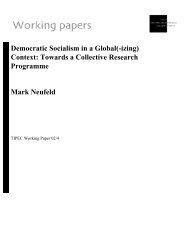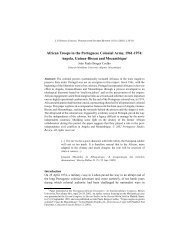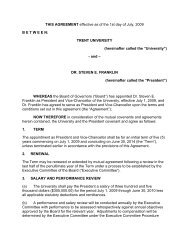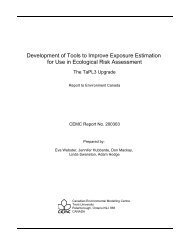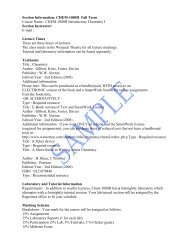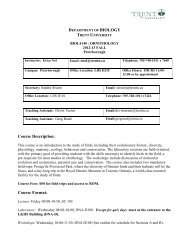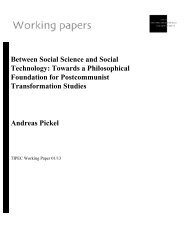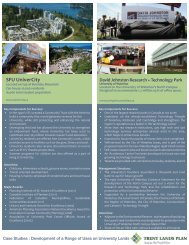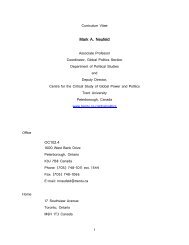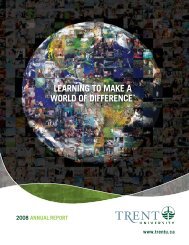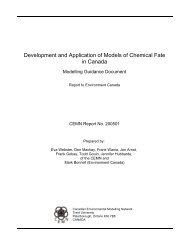Survive and Thrive - Trent University
Survive and Thrive - Trent University
Survive and Thrive - Trent University
Create successful ePaper yourself
Turn your PDF publications into a flip-book with our unique Google optimized e-Paper software.
A C A D E M I C S K I L L S C E N T R E ( A S C )<br />
<strong>Survive</strong> <strong>and</strong> <strong>Thrive</strong><br />
A Guide to Your First Term at <strong>University</strong><br />
P e t e r b o r o u g h • O s h a w a
Contents<br />
Welcome to <strong>University</strong> 1<br />
What to do before you arrive 7<br />
What to do during the first week 8<br />
What to do during the first month 12<br />
What to do during the first term 30<br />
Thanks to Dana Capell, Mary Ann Armstrong, Erin Stewart Eves,<br />
Paul Gamache <strong>and</strong> Ruth Br<strong>and</strong>on for their suggestions.<br />
For information on this<br />
or any of our services, contact<br />
the Academic Skills Centre,<br />
<strong>Trent</strong> <strong>University</strong>, Peterborough,<br />
Ontario K9J 7B8<br />
Phone (705) 748-1720<br />
Fax (705) 748-1830<br />
e-mail: acdskills@trentu.ca<br />
www.trentu.ca/academicskills
Welcome to <strong>University</strong><br />
So, you have finally made it. Congratulations! Feeling excited? Nervous?<br />
Wondering what’s ahead, <strong>and</strong> how you will do? <strong>University</strong> life can<br />
be exhilarating, nerve-wracking, confusing, illuminating, <strong>and</strong>, yes,<br />
sometimes boring. But no matter what happens, you will be forever<br />
changed by the experience.<br />
You want to do well, right? Naturally. It is also natural to keep on<br />
doing what has worked for you in the past; after all, you have reached<br />
university because you learned the skills <strong>and</strong> habits that brought<br />
success in high school. But the game has changed, <strong>and</strong> there is a new<br />
set of rules. <strong>University</strong> is a different sort of school, with its own way<br />
of working <strong>and</strong> its own set of expectations. You must learn the ways<br />
of university <strong>and</strong> learn how to meet these expectations if you are to<br />
survive—<strong>and</strong> thrive—here.<br />
This e-book will help you start off on the right foot. We have drawn<br />
upon our own experiences (we’ve been hanging around universities<br />
most of our adult lives) both as students <strong>and</strong> as teachers, <strong>and</strong> collected<br />
the advice of thous<strong>and</strong>s of students to help make the transition to<br />
university as smooth as possible.<br />
While there is no formula for success at university or anywhere else,<br />
we will show you the problems that other students have encountered<br />
<strong>and</strong> the strategies that worked for them. Think about what we have<br />
to say; try things out. But, ultimately, you will have to figure out what<br />
works for you. Remember, there is no one “right” way to do anything:<br />
there are many ways.<br />
1
What is <strong>University</strong><br />
Anyway?<br />
“<strong>University</strong>” is as much a state of mind as it is a place. When you become<br />
a university student, you do more than attend a particular institution;<br />
you enter into the world of scholars, a world that engages many cultures<br />
<strong>and</strong> reaches through time. You will be engaging with an intellectual<br />
community that has deep roots, <strong>and</strong> just as you will build on the work<br />
of others, future scholars may one day build upon the work you do.<br />
This is serious business!<br />
But it is also fun. <strong>University</strong> is the place where you finally get to learn<br />
about things that interest you instead of just “giving them what they<br />
want.” And, herein lies the first key to how you can survive <strong>and</strong> thrive:<br />
figure out what interests you <strong>and</strong> work on that. The best part is that<br />
by working on what interests you, you will be doing something that<br />
you really enjoy!<br />
How Does <strong>University</strong><br />
Differ From High School?<br />
2<br />
As mentioned, university is a different world. Think about it: you have<br />
chosen which university to attend; you get to choose your own course<br />
of study; you have actually paid to be here. The amount <strong>and</strong> type of<br />
work differ from that of high school, as does the pace, purpose, <strong>and</strong><br />
style of your studies. These differences provide a wealth of opportunity<br />
but also a range of challenges. Let’s explore these differences along<br />
with the keys to successfully taking advantage of the opportunities <strong>and</strong><br />
meeting the challenges that university will bring.
A Difference in Attitude:<br />
Independence <strong>and</strong><br />
Responsibility<br />
Everyone at university will assume that you are an adult. “Good,”<br />
you’re thinking. But with independence comes responsibilities. You will<br />
be expected to manage your own affairs. No one will make you come<br />
to class or h<strong>and</strong> in your work. You skipped class? You did not h<strong>and</strong> in<br />
a major paper? You missed the deadline to drop a course? Unlike in<br />
high school, no one will contact you to find out why or to make sure<br />
that you stay on track. No one will contact your parents <strong>and</strong> express<br />
concern. Instead, they will allow you to make your own decisions <strong>and</strong><br />
to face the consequences of those decisions.<br />
What this means is that you need to make decisions that are in your<br />
best interest. You are now responsible for your own education <strong>and</strong><br />
your own life. There are many qualities that can help you to make<br />
good decisions about your education.<br />
Key Qualities For Success<br />
A Sense of Responsibility - You have a responsibility to yourself.<br />
You must take control of your education, choosing the right<br />
courses, making the right decisions, <strong>and</strong> acting in a way that is<br />
in your own best interest.<br />
Self-Direction - Too often, students see education as “jumping<br />
through the hoops,” or doing what they’re told so that they can<br />
get that elusive piece of paper – a degree. Certainly you must<br />
3
satisfy the requirements of the institution: pay your fees, do<br />
the work, satisfy the course <strong>and</strong> discipline requirements, <strong>and</strong> so<br />
on. But academically, you should be setting the hoops, deciding<br />
through your course selection <strong>and</strong> actual topic choices what ideas<br />
you will pursue <strong>and</strong> what paths you will follow. In other words,<br />
your university education must be self-directed, the result of your<br />
choices, your abilities, <strong>and</strong> your desires.<br />
An Open Mind - <strong>University</strong> will expose you to new ideas <strong>and</strong><br />
ways of doing things. Consider these new approaches carefully<br />
<strong>and</strong> completely instead of dismissing them right away. At times,<br />
you may find yourself disagreeing; this is natural. But resist the<br />
impulse to reduce disagreements to merely “a matter of opinion.”<br />
When these “opinions” involve a discipline, fellow students’ <strong>and</strong><br />
professors’ views are based on training, experience, <strong>and</strong> study;<br />
theirs are “informed opinions.” This is what you have come to<br />
university to get: the training that is needed for you to develop<br />
educated <strong>and</strong> informed views. And you will – if you keep an<br />
open mind.<br />
Openness to Taking Risks <strong>and</strong> Making Mistakes - “We often<br />
discover what we will do, by finding out what we will not do; <strong>and</strong><br />
probably he who never made a mistake never made a discovery,”<br />
said Samuel Smiles. Don’t be afraid of making errors; just be<br />
sure to learn from them. Instead of thinking solely about marks,<br />
concentrate on doing your very best work; the marks will follow.<br />
Persistence - In university, you will encounter challenges <strong>and</strong><br />
sometimes obstacles. When you do, persist. Keep trying, keep<br />
learning, <strong>and</strong> keep asking questions, even when you feel like<br />
giving up. You will find that reward comes from hard work <strong>and</strong><br />
dedication.<br />
4
Remember that the most important factor in your success at university<br />
is your attitude. Take responsibility for your actions <strong>and</strong> for the shape of<br />
your education. Keep an open mind <strong>and</strong> explore this new world openly<br />
<strong>and</strong> honestly, using the methods taught by your professors. Above all,<br />
do what you enjoy, <strong>and</strong> enjoy what you do.<br />
A Difference in Time:<br />
Managing Your Time <strong>and</strong><br />
Workload<br />
Without a doubt, you will spend less time in class <strong>and</strong> yet do more work<br />
in university than you did in high school.<br />
The First Year Workload<br />
On average, a <strong>Trent</strong> first year student<br />
• spends 15-20 hours a week in lectures, seminars, or labs<br />
• is assigned approximately 250 pages of reading per week<br />
• spends approximately 15 hours per week completing weekly<br />
reading assignments<br />
• writes up to 64 pages per term for which he or she completes<br />
additional reading <strong>and</strong> research<br />
In high school, you probably completed many small assignments<br />
throughout the year. In university, you will find that the work tends to<br />
be less evenly distributed throughout the term. This means that you<br />
may not have any assignments due until the end of term, but then you<br />
will have five essays due on the same day (plus exams!).<br />
5
What to do? Somehow, you will have to organize your time so that you<br />
can get your class work done, get your assignments done (on time!),<br />
<strong>and</strong> have a life too. The solution is to develop good time management<br />
skills. Plan ahead; know when your crunch periods are <strong>and</strong> make them<br />
easier by spreading work out throughout the term. Later we will<br />
discuss specific time management tools that will help you to make an<br />
effective plan.<br />
How Can I <strong>Survive</strong><br />
<strong>and</strong> <strong>Thrive</strong>?<br />
The following pages contain a variety of tips that can help you adapt<br />
to the different academic environment that you will find at university.<br />
There are four sections:<br />
• What to do before you arrive<br />
• What to do during the first week<br />
• What to do during the first month<br />
• What to do during the first term<br />
But please remember that these are not “recipes” to be followed<br />
slavishly; they are suggestions that have worked for some students in<br />
the past. You must always discover what works for you.<br />
6
What To Do Before You Arrive<br />
Seek Out Academic Advising <strong>and</strong><br />
Choose Your Courses<br />
<strong>Trent</strong> offers New Student Advising days throughout the summer.<br />
Attend one if you can as they will provide you with valuable<br />
information about choosing courses <strong>and</strong> preparing for university.<br />
Please visit: www.trentu.ca/nsa<br />
You should also spend some time familiarizing yourself with the<br />
academic calendar. Know degree requirements for your program:<br />
B.A., B.Sc., B.B.A., B.Sc.N., B.Sc.F.S. For some programs, your path is<br />
determined, but you may have some choice in your courses. For other<br />
degrees, it is wide open. Make choices for yourself based on your<br />
interests <strong>and</strong> goals; be aware of course material, look at outlines, see the<br />
reading list: Cultural Studies may not be what you expect or Astronomy<br />
may require more math than you expect. Ask about courses, consider<br />
long term planning, but be open: you may take ERS because you like<br />
the environment, but it could become your major!<br />
Prepare Yourself<br />
Universities are not designed to do the same things as high schools,<br />
which are supposed to give you the basic skills of communication,<br />
thought, <strong>and</strong> expression. <strong>University</strong>, as the next step, will teach you the<br />
methods of your chosen discipline(s), so you can begin to make sense of<br />
the world at a more complex level. Your professors are expecting that<br />
you will have already mastered the basic skills of reading, writing, <strong>and</strong><br />
speaking. As a result, they will spend little, if any, time showing you<br />
grammar <strong>and</strong> punctuation or the paragraph, essay <strong>and</strong> bibliographic<br />
formats that you will need.<br />
7
Have you mastered these things? Are your skills good enough for the<br />
next level? Are you confident that you know how to write well? If not,<br />
consider what you can do about it.<br />
Start Preparing From Home!<br />
The Academic Skills Centre offers free online materials on<br />
topics ranging from essay writing, critical reading, <strong>and</strong><br />
notetaking to mathematics <strong>and</strong> exam preparation. Check<br />
out www.trentu.ca/academicskills to start preparing for<br />
university from home!<br />
Summary: Before You Arrive<br />
3<br />
3<br />
3<br />
3<br />
Attend a New Student Advising day.<br />
Register for classes.<br />
Find resources that will help you improve your reading,<br />
writing, <strong>and</strong> thinking skills.<br />
Get a feel for what is ahead <strong>and</strong> what will be required of you.<br />
What To Do During the<br />
First Week<br />
Check Out Your Courses<br />
8<br />
Introductory Week is the time to check out all of the courses that you’re<br />
thinking of taking. Go to the information sessions, listen, gather the<br />
h<strong>and</strong>outs, <strong>and</strong> ask questions. Many course outlines are available online.
Check them out to see what you’re getting into. Look at them carefully:<br />
How much reading is expected? How much writing? What topics will be<br />
covered? How many essays, exams, <strong>and</strong> other assignments are required?<br />
Knowing this information before plunging into a course will help you<br />
to think about its place amongst your other choices.<br />
Seek Advice<br />
<strong>Trent</strong> is a very friendly place, built on a personal scale. Take advantage<br />
of this by seeking advice from as many people as you can. Ask secondyear<br />
students about courses <strong>and</strong> professors <strong>and</strong> talk to the professors<br />
themselves. Don’t forget to consult your Senior Tutor or Academic<br />
Advisor for help with academic matters such as ensuring that you take<br />
the courses that will allow you to pursue your chosen field, explaining<br />
the sometimes confusing administrative requirements <strong>and</strong> deadlines,<br />
<strong>and</strong> helping you to fill out <strong>and</strong> submit all the required forms. Your<br />
academic advisor won’t know everything, but he or she will know how<br />
to find out for you. Visit: www.trentu.ca/advising<br />
Explore Support Options<br />
In addition to academic advising, <strong>Trent</strong> offers many other support<br />
services. Either online or in person, take an opportunity to find out<br />
about the following:<br />
Career Centre, www.trentu.ca/careers/<br />
Disability Services Office, www.trentu.ca/disabilityservices/<br />
Health Services, www.trentu.ca/studentaffairs/healthservices.php<br />
Counselling, www.trentu.ca/counselling/<br />
<strong>and</strong> the Academic Skills Centre, www.trentu.ca/academicskills/<br />
The staff in these offices is committed to providing you with<br />
academic <strong>and</strong> emotional support as you make the transition to<br />
university. Do not be afraid to ask for help; indeed, asking for<br />
assistance early, before a situation has become critical, is a key way<br />
to survive <strong>and</strong> thrive!<br />
9
Get to Know the Library<br />
The library is the centre of the scholarly universe, its heart, if you will.<br />
And like a heart, the library never stops, continually bringing in new<br />
information <strong>and</strong> ideas <strong>and</strong> pumping them out again into the real world<br />
(libraries even call this activity circulation). Material is available online<br />
via the library website <strong>and</strong> on the web at large. But, please note that the<br />
library houses many reference books, monographs, maps, government<br />
documents, archival materials <strong>and</strong> the expertise of trained librarians<br />
<strong>and</strong> researchers; these are not always available in an online format.<br />
You may be used to doing all of your research online, but the librarians<br />
can help you learn to find appropriate materials with directed searches.<br />
So, learn how to use the library. The library provides excellent online<br />
library skills tutorials that are available through the library website at<br />
www.trentu.ca/admin/library/help/skills/ You can also register for an<br />
in-person library workshop to see how the place works.<br />
Find a Place Where You Can Work<br />
10<br />
As soon as possible, stake out a physical space that meets your<br />
requirements. If you need isolation <strong>and</strong> quiet, look for that. If you need<br />
to be around people, search for that space. If you need food while you<br />
work, look around the cafeterias. Different people require different<br />
working conditions, so look for a place that offers what you need.<br />
Get to Know <strong>Trent</strong>’s Technology<br />
After arriving on campus, you will want to get acquainted with <strong>Trent</strong>’s<br />
Information Technology department at www.trentu.ca/it/student.php<br />
Here you can find out how to configure your computer for Air <strong>Trent</strong><br />
<strong>and</strong> how to access your campus email <strong>and</strong> My<strong>Trent</strong> accounts. Use your<br />
<strong>Trent</strong> accounts; important information is often posted on My<strong>Trent</strong>, <strong>and</strong>
the administrative <strong>and</strong> academic departments at <strong>Trent</strong> often require<br />
email to originate from a trentu.ca account.<br />
Many classes use MyLearning System to post course outlines, lecture<br />
notes, <strong>and</strong> assignments. Log on to the system at www.trentu.ca/mls<br />
<strong>and</strong> get familiar with its features. Make sure to note which classes have<br />
discussion forums as these are often places where students can post<br />
questions or organize study groups.<br />
Summary: The First Week<br />
3 Choose your courses carefully <strong>and</strong> be open to making a change<br />
– find the best fit for the year <strong>and</strong> your long-term plans.<br />
3 Ask for advice from your academic advisor, upper year students,<br />
<strong>and</strong> professors – but weigh it carefully.<br />
3 Explore the campus; find out where everything is.<br />
3 Learn the important dates for drop-add deadlines,<br />
reading week <strong>and</strong> holidays; record them in your planner.<br />
3 Explore the library; use the online tutorials.<br />
3 Establish a workspace that will work for you.<br />
11
What to Do During the<br />
First Month<br />
Organize Your Courses<br />
Each course has a “course outline” (something called a “syllabus”).<br />
READ IT! These outlines contain much of the crucial course information:<br />
the goals <strong>and</strong> themes of the course, the schedule of class readings, the<br />
seminar schedule, the lecture schedule, the assignment due dates (<strong>and</strong><br />
often, the assignments themselves), the professor’s office hours, <strong>and</strong><br />
much more. They serve as a type of “contract,” detailing what you<br />
will receive <strong>and</strong> what you are expected to give in return, as well as all<br />
of the deadlines. Often, professors will assume that you are aware of<br />
the assignments <strong>and</strong> deadlines listed in the course <strong>and</strong>, as a result, will<br />
never mention them in class.<br />
As you get each outline, put it in a place of honour. Read each outline.<br />
Then, compare outlines: are there a number of assignments due around<br />
the same time? If so, start planning ahead to deal with these crunch<br />
times.<br />
12<br />
Make a Plan to Manage Your Time<br />
Creating a time management plan can help you to meet the new<br />
dem<strong>and</strong>s of university. First, your time is no longer as clearly organized<br />
<strong>and</strong> structured by school as it has been in the past. Second, you are<br />
responsible for figuring out what is expected of you <strong>and</strong> how you will<br />
meet those expectations. Third, you need to have balance in your life;<br />
it is important to have a great social experience that does not come<br />
at the expense of your learning experience at <strong>Trent</strong>. So, consider how
you can adapt to university <strong>and</strong> succeed academically while having fun.<br />
That is what time management is all about.<br />
Short-Term Planning<br />
Short term planning involves creating a weekly schedule<br />
that allows you to complete your work. Creating a 24-hour<br />
schedule is an excellent way to start your planning. A 24-hour<br />
schedule sounds daunting, but it allows you to be flexible <strong>and</strong><br />
to work at times which suit you best, whether you prefer the<br />
moonlight or early morning sun for study. The ASC provides<br />
free, downloadable schedules like the one below, online at:<br />
www.trentu.ca/academicskills<br />
24/7 schedule<br />
7 AM<br />
SUN MON TUES WED THURS FRI SAT<br />
8 AM<br />
9 AM<br />
10 AM<br />
11 AM<br />
12 PM<br />
1 PM<br />
2 PM<br />
3 PM<br />
4 PM<br />
5 PM<br />
6 PM<br />
7 PM<br />
8 PM<br />
9 PM<br />
10 PM<br />
11 PM<br />
12 AM<br />
1 AM<br />
2 AM<br />
3 AM<br />
4 AM<br />
5 AM<br />
6 AM<br />
13
Making a 24-Hour Schedule<br />
Block off all of your class, seminar, <strong>and</strong> lab times.<br />
Block off your paid work hours, volunteer commitments, or<br />
program placement.<br />
Block off times for socializing, shopping, eating, <strong>and</strong> exercise.<br />
For each course, start off planning for three hours a week per<br />
course of “keeping-up” work such as weekly readings or exercises.<br />
As time goes by, you may have to add more time or subtract time.<br />
These can be in one large block or in three one-hour chunks of<br />
time; you may adapt this as you work through your courses.<br />
Schedule in “major assignment” time. This is time that you can<br />
focus on research, writing, <strong>and</strong> preparation for essays, labs,<br />
projects, or exams. Each week, you can decide which major<br />
assignments you need to focus on based on your long term<br />
planning.<br />
Long-Term Planning<br />
In addition to having a weekly schedule, it is essential to create<br />
a long term plan that will allow you to know when your major<br />
assignments are due <strong>and</strong> whether you have crunch periods during<br />
which you have many assignments due at once. A 4-Month<br />
Planner can be an excellent tool to use. Again, the ASC provides<br />
free downloadable calendars like the one on the following<br />
page, online at www.trentu.ca/academicskills/resources.php. The<br />
bookstore also sells poster-sized “Term at a Glance” calendars<br />
that you can write on with a dry erase marker.<br />
14
January 2010 – April 2010<br />
January 2010 February 2010<br />
S M T W T F S S M T W T F S<br />
1 2 1 2 3 4 5 6<br />
3 4 5 6 7 8 9 7 8 9 10 11 12 13<br />
10 11 12 13 14 15 16 14 15 16 17 18 19 20<br />
17 18 19 20 21 22 23 21 22 23 24 25 26 27<br />
24 25 26 27 28 29 30 28<br />
31<br />
March 2010 April 2010<br />
S M T W T F S S M T W T F S<br />
1 2 3 4 5 6 1 2 3<br />
7 8 9 10 11 12 13 4 5 6 7 8 9 10<br />
14 15 16 17 18 19 20 11 12 13 14 15 16 17<br />
21 22 23 24 25 26 27 18 19 20 21 22 23 24<br />
28 29 30 31 25 26 27 28 29 30<br />
Making a Long Term Plan<br />
Go through the course outline for each class <strong>and</strong> carefully note<br />
all assignment due dates <strong>and</strong> exams.<br />
Put these dates onto your 4-month calendar. You can use a<br />
different colour for each course if this helps. Keep this calendar in<br />
plain view for quick reference. Don’t forget important birthdays<br />
<strong>and</strong> planned trips home as you often need to work around them.<br />
Block off reading week <strong>and</strong> know that you will have this time to<br />
prepare assignments.<br />
Indentify your “crunch times,” periods when you have multiple<br />
assignments or exams.<br />
Plan for these times by deciding when you need to start each<br />
assignment in order to get it done in time.<br />
You may want to make intermediate deadlines for different<br />
stages of each assignment <strong>and</strong> put these on your calendar.<br />
15
Having a time management plan can give you control over your work<br />
<strong>and</strong> your life. Review your plan constantly; update it often. If you fall<br />
behind, don’t worry, simply rearrange your schedule. If something<br />
unexpected happens, go with it <strong>and</strong> rearrange your plan later.<br />
Remember, you control it; it doesn’t control you.<br />
The Academic Skills Centre offers many time management resources<br />
on our website. You can also book an appointment with an instructor<br />
to create a personal time management plan.<br />
Get to Class<br />
As mentioned, one of the big differences between high school <strong>and</strong><br />
university is the difference in attendance requirements: in university,<br />
you are often not required to attend class. You may be tempted to skip<br />
a class or two for one reason or another, but don’t do it! Skipping class<br />
has a number of repercussions.<br />
You will create a bad impression with your professors <strong>and</strong> tutorial<br />
leaders, implying that you have something more important to do<br />
than to attend class. You will also miss the chance to participate<br />
<strong>and</strong> to ask questions.<br />
16<br />
You will miss both information <strong>and</strong> learning. The information can<br />
be provided by a classmate, but the learning is gone for good.<br />
Another law of life says that whatever is discussed in the one<br />
class that you miss will make up the bulk of the exam!<br />
Speak Up – Don’t Be Intimidated<br />
For many students, university can be quite intimidating. Everything is<br />
new <strong>and</strong> confusing, <strong>and</strong> the other students seem so much more at ease<br />
<strong>and</strong> so much more knowledgeable about what’s going on. Everyone<br />
else must be much smarter, you may think. Wrong!
Actually, everyone is in pretty much the same boat; it’s just that some<br />
people are better at hiding their insecurities than others. Don’t be<br />
intimidated! Forget about everyone else <strong>and</strong> concentrate on learning<br />
what you need to know.<br />
If you don’t underst<strong>and</strong> something or have questions, ask! If you find it<br />
difficult to participate in seminars, try writing out some ideas of interest<br />
or questions before you arrive. Having something written down may<br />
help you to speak with more confidence.<br />
Develop Your Listening/Notetaking Skills<br />
<strong>University</strong> lectures can be quite different from what you are used to. Basically,<br />
a professor will st<strong>and</strong> at the front of a big room <strong>and</strong> talk to you for an hour or<br />
so, trusting that you will be able to listen to what is being said, figure out what<br />
is important enough to write down, think about the ideas being discussed,<br />
<strong>and</strong> develop questions. Often, the lecturer will also use PowerPoint, requiring<br />
you to read as well as listen. There will be few, if any, h<strong>and</strong>-outs <strong>and</strong> only some<br />
indication of what the main points are. Welcome to the university lecture.<br />
Many first-year students have trouble getting the most out of lectures,<br />
especially at first. There seem to be two main problems that can cause<br />
this difficulty:<br />
1. Information goes by once, usually very quickly. If you miss<br />
something (say, you are writing instead of listening), it’s gone.<br />
2. It’s difficult to separate what is important, the main points<br />
that you need to note, from secondary points.<br />
One of the best ways to meet the challenge of underst<strong>and</strong>ing <strong>and</strong> taking<br />
good notes during lectures is to think of the lecture as more than a<br />
one-shot, fifty-minute experience. Instead, think of it as a three-part<br />
experience, <strong>and</strong> realize that you will need to participate actively in each<br />
part in order to get the most out of lectures.<br />
17
The Lecture Experience:<br />
A play in three acts<br />
Act I: Before<br />
Prepare for lectures<br />
before they begin <strong>and</strong><br />
try to anticipate what<br />
they will cover<br />
Act II: During<br />
Listen actively <strong>and</strong><br />
find a note-taking<br />
system that works<br />
for you<br />
Act III: After<br />
Review <strong>and</strong><br />
respond to your<br />
notes<br />
18<br />
Part I: Before the Lecture<br />
• Read the syllabus to see what the unit is about <strong>and</strong> what the title<br />
of the lecture is. Think about where the lecture fits into the course.<br />
• Consider what you already know about the topic <strong>and</strong> try to<br />
anticipate what might be covered.<br />
• Review your notes from previous lectures to further re-establish<br />
the context of the course in your own mind.<br />
• Do assigned readings. Anticipate how they might relate to the<br />
lecture ahead.<br />
• If they are posted ahead of time, download <strong>and</strong> copy any outlines<br />
or list of key terms for the lecture ahead. If PowerPoint slides are<br />
posted, print them in h<strong>and</strong>out form so you can make additional<br />
notes, identify key information <strong>and</strong> indicate connections.<br />
• Make a list of questions you would like to have answered by the lecture.<br />
Part II: During the Lecture<br />
• Listen Actively; it is not necessary to record the lecturer’s every<br />
word or idea. Not only is this physically impossible, but excessive<br />
writing can become a barrier to listening. What good is writing<br />
down things that you don’t underst<strong>and</strong>, anyway?<br />
• Listen for important points.<br />
• Listen for relationships between ideas in texts, class discussions<br />
<strong>and</strong> the lectures.<br />
• Listen for cue words; they help you cluster <strong>and</strong> prioritize<br />
information.
Cue Words<br />
Words that signal emphasis<br />
or importance<br />
- essential<br />
- crucial<br />
- significantly<br />
- vital<br />
Words that signal the order or<br />
scope of a topic<br />
first, second, third<br />
initially<br />
finally<br />
for instance<br />
an illustration of this<br />
Words that indicate the lecture<br />
is moving in a new direction<br />
however<br />
nonetheless<br />
whereas<br />
in contrast<br />
Words that signal that<br />
parts of the lecture are<br />
not relevant <strong>and</strong> may NOT<br />
need to be written down<br />
incidentally<br />
by the way<br />
Know What to Write Down<br />
• Record new or unfamiliar facts <strong>and</strong> ideas.<br />
• Include things that come in lists: if the lecturer has created a list to<br />
categorize facts, reasons, themes, etc., it’s a good indication that<br />
the information is important.<br />
• Note the lecturer’s reasons for questioning or favouring a particular<br />
approach or theory.<br />
• Underline points which the lecturer pauses over or repeats: people<br />
lecture with certain goals in mind, <strong>and</strong> usually when they convey<br />
a point which is crucial to their thesis they repeat it.<br />
• Don’t write down what is on the PowerPoint slide if you have<br />
access to it later. There is no need to repeat information.<br />
Develop a Notetaking System<br />
• Develop your own short-h<strong>and</strong> of abbreviations <strong>and</strong> symbols.<br />
• Write in point form.<br />
• Leave lots of white space to fill in later when you complete your<br />
comments on the lecture or fill in gaps.<br />
• For laptop notetaking, make sure to save often.<br />
• For tape-recording: ask for the instructor’s permission, sit near the<br />
front of the class, <strong>and</strong> take notes as well if possible.<br />
19
The Cornell Method<br />
The Cornell Method is one of the most common <strong>and</strong> popular<br />
notetaking systems. In this method of note-taking, you begin by<br />
drawing a line down the length of your paper about one-third of<br />
the way through the page. On the left side of the page, write only<br />
key terms or ideas. Leave most of the space blank. On the right side<br />
of the page, take notes on the lecture in point form.<br />
Later, the space on the left side can be used to add in or exp<strong>and</strong> on<br />
information, highlight key points, or raise key questions.<br />
20
Part III: After the Lecture<br />
Just as the lecture experience begins before the professor begins<br />
speaking, it continues well after he or she is done. Many students leave<br />
the lecture hall <strong>and</strong> file their notes away until exams. Unfortunately,<br />
research shows that in doing so, they lose a significant amount of what<br />
they just learned. Instead, review your notes soon after the lecture ends.<br />
• Read through your notes as soon as you can after the lecture<br />
ends. Highlight or underline main points. Put stars next to key<br />
information. Try to fill in any gaps in your notes.<br />
• Respond to <strong>and</strong> reflect on your notes in the margins of the paper.<br />
You can use one margin to make a list of terms that corresponds to<br />
the information in the body of your notes. You can use the other<br />
side of the margin to write a short summary of a key idea or make<br />
a connection between the point made in lecture <strong>and</strong> ideas from<br />
readings or seminars.<br />
• Discuss your notes with a friend or study group. This can help you<br />
to process information, fill in gaps in your notes, <strong>and</strong> deepen your<br />
underst<strong>and</strong>ing of the main points.<br />
• Make flashcards or lists of key terms. You don’t need to wait for the<br />
end of the term to start preparing for exams. Take a few minutes<br />
to put key vocabulary terms or concepts on index cards or a list of<br />
terms with a brief definition.<br />
Develop Your Reading Skills<br />
Academic reading is almost always difficult reading. It is usually densely<br />
packed with ideas <strong>and</strong> implications that need to be thought out <strong>and</strong><br />
considered. The result is that your reading will take time – lots of it.<br />
It will also require that you read actively <strong>and</strong> critically. Critical reading<br />
involves breaking the argument down into its parts to see how well<br />
each part works <strong>and</strong> how parts of the argument work together. In high<br />
school you developed the ability to determine what the text says. Your<br />
post-secondary reading will challenge you to determine what a text<br />
does <strong>and</strong> how it does it.<br />
21
Like lectures, one of the best ways to approach university reading is to<br />
see it as a three-part experience: before, during, <strong>and</strong> after. And, what<br />
you do before <strong>and</strong> after you begin a reading is as important to your<br />
comprehension of it as what you do while you read.<br />
Part I: Preview Before You Read<br />
Critical reading is far easier if you have a sense of the purpose <strong>and</strong> main<br />
point of a text before you begin reading it in depth. Having this in your<br />
mind can help you to follow the author’s argument more clearly <strong>and</strong> to<br />
separate essential ideas from supporting details. One way to develop<br />
a sense of the purpose of the source is to preview before you read.<br />
• Read <strong>and</strong> underst<strong>and</strong> the title.<br />
• Examine the table of contents <strong>and</strong>/or section headings.<br />
• Read the introductory sections(s).<br />
• Skim through the text looking for main ideas; read topic sentences,<br />
transitional sections, bolded elements, captions, boxes.<br />
• Read concluding sections(s).<br />
• Read text summary <strong>and</strong> summary questions (if they are provided in<br />
your text).<br />
• Determine the thesis of article or book.<br />
By the end of your preview, you should be able to explain <strong>and</strong> write<br />
down:<br />
1. The main topic or question that the text will address<br />
2. The author’s main argument or thesis<br />
3. The structure of the reading or how the author has<br />
organized his or her ideas<br />
Part II: As You Read<br />
22<br />
Once you have previewed a text, you can begin reading it in detail,<br />
confident in the knowledge that you know where the text is going. To<br />
read critically, you must read actively. Ask questions as you read: How<br />
is the author supporting his or her argument? What assumptions are<br />
made? What types of evidence are used? How do the ideas compare to
other texts that you have read or to what you have heard in lecture?<br />
What do you find intriguing or puzzling? Are you convinced by the<br />
argument?<br />
As for lectures, you will also need to find a good notetaking system so<br />
that you can record the information <strong>and</strong> ideas that you will need for<br />
seminars <strong>and</strong> exam preparation. There are many systems to explore,<br />
including reverse outlining, concept mapping, <strong>and</strong> the Cornell method.<br />
You can explore these methods in detail through the Academic Skills<br />
website at www.trentu.ca/academicskills You may need to experiment<br />
to find the method that works best for you.<br />
Tips for Effective Notetaking During Reading<br />
• Before you begin taking detailed notes, write down the topic<br />
or question the text focuses on <strong>and</strong> the author’s thesis or<br />
main point.<br />
• Read a text in small chunks, the length of which will depend<br />
on the length of the text. Take notes after you read a<br />
paragraph, section, or chapter. This will ensure that you<br />
write down only the most important information.<br />
• Use point form. Avoid recopying the text.<br />
• After you complete your reading, make a list of the 3-5 most<br />
important points.<br />
Part III: Review <strong>and</strong> Reflect After You Read<br />
Just as we suggest you do after a lecture, take some time after<br />
completing a reading to review your notes <strong>and</strong> reflect on them. If there<br />
are review questions, answer them. If there are key terms listed at the<br />
end, define them. You can even write them directly onto flashcards to<br />
aid in exam preparation. If review exercises are not provided, make<br />
your own. What 3-5 questions would you ask about the reading? What<br />
23
terms do you think are most important? What questions will you ask or<br />
points will you make about the reading during seminar?<br />
Reading is a large <strong>and</strong> complex topic, <strong>and</strong> we have just touched on the<br />
basics here. If you find that you need help, don’t wait! Check out the<br />
resources on the Academic Skills website www.trentu.ca/academicskills<br />
or book an individual appointment with a skills instructor by calling<br />
748-1720.<br />
Develop Your Math Skills <strong>and</strong> Keep Up<br />
With Problem Sets<br />
Don’t expect math in your studies at <strong>Trent</strong>? Think again; students<br />
are often surprised to discover the importance of math in many<br />
disciplines: statistics are integral to research in psychology, geography,<br />
<strong>and</strong> environmental <strong>and</strong> resource studies; economics is discussed in<br />
international development studies, politics, <strong>and</strong> history; <strong>and</strong> math basics<br />
are necessary for nursing, accounting, <strong>and</strong> forensics.<br />
Particularly for classes in mathematics, but also for problem-based<br />
courses like economics, statistics, physics <strong>and</strong> chemistry, you will be<br />
required to complete weekly exercises, which may be in place of or<br />
in addition to text or online reading. Your success in these courses<br />
depends on your commitment to completing these exercises; working<br />
through problems, using formulae, <strong>and</strong> developing a mathematical<br />
vocabulary <strong>and</strong> skill base through practice will help you to make sense<br />
of course material that is more abstract <strong>and</strong> theoretical than the math<br />
you know from high school.<br />
24<br />
Another difference you may not expect: there is no in-class time to<br />
work on exercises; however, in some classes, voluntary workshop time<br />
is available. Lecture time is usually spent copying notes from the<br />
blackboard or overhead projector screen. As soon after class as possible,<br />
re-read your lecture notes <strong>and</strong> the section of the text that covers that
topic. Use the margins to indicate important points <strong>and</strong> trouble spots.<br />
Then, work your way through the exercises assigned in the lecture, using<br />
the solved examples as a model. Although many exercises are designed<br />
to develop skills, there are other types of exercises as well: some ask<br />
for proofs, some have a number of correct answers.<br />
Working alone on exercise sets may prove frustrating, <strong>and</strong> you may<br />
find it hard to concentrate. Some students find it helpful to work with<br />
a classmate or a study group to discuss solutions. If you get stuck, ask<br />
for help at workshops <strong>and</strong> labs or during your instructors’ office hours.<br />
Often, you may not find a solution to a question on the first attempt;<br />
but if you persevere, you will probably find the solution later. For this<br />
reason, you must not wait until the last minute to do assignments<br />
or to prepare for quizzes <strong>and</strong> tests. Train yourself to think logically.<br />
Underst<strong>and</strong> the procedure used to reach solutions. While it is unlikely<br />
that you will be able to memorize everything, you will be expected to<br />
know basic formulas <strong>and</strong> to underst<strong>and</strong> when <strong>and</strong> how to use them.<br />
Learning math takes much time <strong>and</strong> effort; indeed, the time you need<br />
to devote to studying math is comparable to the time required for<br />
reading <strong>and</strong> lab work in other courses. To prepare for tests <strong>and</strong> quizzes,<br />
you must try all the exercises suggested in lectures, even if you are not<br />
required to submit them. This will require self-discipline. If you do not<br />
stay up-to-date, you will quickly lose ground in the course, <strong>and</strong> it can<br />
be difficult to catch up. As you build your skills, you will develop more<br />
confidence <strong>and</strong> appreciate the beautiful challenge of mathematics.<br />
Develop Your Writing Skills<br />
Most of your marks will come from your writing, either in assignments<br />
or exams. It makes sense, then, to focus on developing your writing<br />
skills. Many students find the writing assignments at university to be<br />
different <strong>and</strong> more challenging than high school writing.<br />
25
What is an essay?: Thesis <strong>and</strong> Evidence<br />
The essay or research paper is the most common university writing<br />
assignment, <strong>and</strong> the university essay differs considerably from many<br />
high school essays. In high school, your essays likely focused on providing<br />
detailed information to describe a topic. In a university essay, you will<br />
need to go beyond description to explain, analyse, <strong>and</strong> interpret a<br />
question, issue, or idea. This explanation or analysis becomes your<br />
argument, or thesis. You then need to provide detailed information,<br />
or evidence, that supports your thesis.<br />
Thesis Statements<br />
A Good Thesis:<br />
• is a declaration of the direction <strong>and</strong> purpose of your essay<br />
• is clear <strong>and</strong> concise – generally 1-2 sentences<br />
• indicates an argument or answers a question<br />
• does something: answers a question or investigates an issue<br />
For example:<br />
Cable TV has not delivered on its promise to provide an<br />
educational alternative to network programming due to its<br />
reliance on major donors <strong>and</strong> sponsors within the business<br />
community.<br />
The aging of the Canadian population will eventually create<br />
an economic crisis; unfortunately, because this problem is not<br />
immediate, the government lacks the political will to solve the<br />
problem.<br />
The success of newspapers like the Sun, which focus almost<br />
exclusively on human interest stories <strong>and</strong> rely on simple<br />
language, indicates that Canadians want their news to be easy<br />
to read <strong>and</strong> entertaining.<br />
26<br />
A good thesis is NOT<br />
an announcement: “My essay will discuss whether cable TV<br />
is educational” is a topic, NOT a thesis.
a factual statement: “The proportion of the Canadian<br />
population that is over 65 is growing” is a fact, NOT a thesis.<br />
a question: “How does the publishing industry cater to the<br />
taste of Canadians?” is a research question, NOT a thesis. A<br />
thesis is an answer to a question.<br />
Moving Beyond the Five-Paragraph<br />
Essay<br />
In high school, you may have been taught one way to organize an<br />
essay: the five-paragraph model in which you make one point <strong>and</strong><br />
provide three examples to support this point. While there is nothing<br />
inherently wrong with this organizational model, at university you will<br />
find that you will not be able fit every assignment into this pattern.<br />
Indeed, the five-section model is just that – a model; it is one way to<br />
write an essay, but it is not the only way. It was adequate for one stage<br />
of your education, but now that you are becoming more intellectually<br />
sophisticated, you will need to develop more intellectually sophisticated<br />
ideas <strong>and</strong> methods.<br />
Instead of relying on a set pattern, you will want to organize your essay<br />
based on your thesis statement. An outline can help you to order your<br />
ideas in an organized fashion. But an outline does not necessarily mean<br />
you need three separate points. Use the assignment requirements, your<br />
research, <strong>and</strong> your thesis to guide your outline. For more information<br />
on moving beyond the 5-pargaraph essay <strong>and</strong> organizing your writing,<br />
visit the Academic Skills Centre’s website: www.trentu.ca/academicskills<br />
27
Avoiding Plagiarism<br />
In any piece of writing, you will need to provide evidence to support your<br />
ideas. Your evidence might include events, data, or other information.<br />
It will very often include arguments, ideas, or words that you came<br />
across in another author’s work. When using the ideas, information,<br />
or the actual words of another author, it is absolutely essential to use<br />
proper documentation in order to avoid plagiarism.<br />
Plagiarism is the passing off of someone else’s words or thoughts as<br />
your own. All students must confront these questions: Is this material<br />
original (i.e. are these my own ideas)? If not, how should I use the<br />
material appropriately in my own writing? And finally, how do I show<br />
where I found this information? Failure to adequately deal with these<br />
questions may lead to plagiarism, which is a serious academic offence<br />
that may result in a failure of the assignment or the course. It can also<br />
lead to a notation on your transcript. For more information about<br />
plagiarism <strong>and</strong> its consequences, visit Academic Integrity website at<br />
wwww.trentu.ca/deanundergraduate/integrity_students.php <strong>and</strong> the<br />
Academic Skills Centre’s website: www.trentu.ca/academicskills<br />
28<br />
Tips for avoiding plagiarism:<br />
• Anytime that you summarize or paraphrase (put into your<br />
own words) an author’s ideas or information, you must cite<br />
your source.<br />
• If you directly quote (use the exact words of) an author, you<br />
must put his or her words into quotation marks <strong>and</strong> cite your<br />
source.<br />
• When you are researching a paper, make sure to take notes<br />
on sources in your own words. Avoid cutting <strong>and</strong> pasting. If<br />
you decide to quote an author directly, clearly note this by<br />
using quotation marks. Always keep track of the page number<br />
on which you find a piece of information.<br />
• Different courses require different methods of documenting
sources. Check your syllabus or assignment sheet to<br />
see which style you should use for an assignment. If no<br />
direction is given, use the departmental listing on the<br />
Academic Skills Centre’s Documentation Website at:<br />
http://www.trentu.ca/documentation/overview.php.<br />
• The Academic Skills Centre’s Documentation Website at<br />
http://www.trentu.ca/documentation/overview.php provides<br />
complete information on what information needs to be cited<br />
<strong>and</strong> how it should be cited. Consult it often.<br />
Further Resources for Developing Your<br />
Writing<br />
This e-book provides only a short overview of university writing. The<br />
Academic Skills Centre provides many other resources to help you<br />
develop your writing skills. The ASC’s website contains tip sheets <strong>and</strong><br />
online resources on the writing process <strong>and</strong> avoiding plagiarism. We<br />
also offer a series of workshops on essay writing each fall. Finally, you<br />
can book an individual appointment with an academic skills instructor<br />
to discuss any aspect of the writing process. For info on all of these<br />
services, visit our website www.trentu.ca/academicskills Take advantage<br />
of these resources, <strong>and</strong> remember, learning to write is like running a<br />
marathon, not a 100-meter dash: pace yourself!<br />
Summary: The First Month<br />
3<br />
3<br />
Organize your courses; read your course outlines to know<br />
what work you must do, the topics, <strong>and</strong> the deadlines.<br />
Make a time management plan for the term so that you can<br />
manage your time; include both your school work <strong>and</strong> your life.<br />
29
3<br />
3<br />
3<br />
3<br />
Get to class; establish good habits right away.<br />
Speak up; don’t be intimidated by anyone; persevere.<br />
Develop your listening <strong>and</strong> your notetaking skills; find a<br />
notetaking system that works for you.<br />
Work on your reading <strong>and</strong> writing skills.<br />
What to Do During the<br />
First Term<br />
Study Throughout the Term<br />
30<br />
Leaving your studying to the night before the exam is a sure-fire recipe<br />
for disaster. Instead, spread your studying out over the whole term. The<br />
easy way to do this is to preview the reading before each lecture, review<br />
the lecture notes as soon as possible after each lecture, <strong>and</strong> review the<br />
previous week’s notes before the next lecture. Not only will this make<br />
cramming for exams unnecessary, but it will help you to fit the lecture<br />
<strong>and</strong> reading material into a “whole” <strong>and</strong> give the course shape in your<br />
mind, something which will also help you write your essays, participate<br />
in class, <strong>and</strong> make reading less daunting. The more often you read <strong>and</strong><br />
re-read the material, the more sense it will make <strong>and</strong> the more useful<br />
it will become.<br />
Review Your Progress <strong>and</strong> Adjust Your Plan<br />
Try to avoid living <strong>and</strong> dying with each class or assignment grade. Instead,<br />
take the long view from time to time, <strong>and</strong> realize that everything has its<br />
short-term ups <strong>and</strong> downs. But as circumstances dem<strong>and</strong>, modify your
work habits <strong>and</strong> your time management plan. After all, it’s meant to<br />
serve you; you don’t serve it. Always the question is what you need to<br />
do to improve, regardless of the actual grades you receive. There is no<br />
end to improvement, just as there is no end to learning.<br />
Seek Help When You Need It<br />
Too many students make the mistake of thinking that they are in this<br />
alone. They are not, <strong>and</strong> you are not. <strong>Trent</strong> has numerous sources<br />
of support for students in need: Professors can be reached during<br />
office hours <strong>and</strong> by email: www.trentu.ca/advising. Senior Tutors <strong>and</strong><br />
the Career Centre can help with majors, www.trentu.ca/careers the<br />
Disability Services Office can help with accommodations for disabilities:<br />
www.trentu.ca/disabilityservices. Health Services <strong>and</strong> Counselling<br />
provide personal help: www.trentu.ca/studentaffairs/healthservices.<br />
php <strong>and</strong> www.trentu.ca/counselling, <strong>and</strong>, of course, the Academic<br />
Skills Centre can help with reading, writing, math, <strong>and</strong> listening skills:<br />
www.trentu.ca/academicskills. Ask around. The help is probably there:<br />
you just need to find it.<br />
Much research exists from psychology <strong>and</strong> education to suggest<br />
that student achievement cannot be solely predicted by previous<br />
performance or ability; rather it is the attitude of a student which is<br />
more closely linked to success at university. This means your approach to<br />
school, your willingness to participate <strong>and</strong> seek out assistance or advice,<br />
<strong>and</strong> your openness to ideas all affect how well you do in your studies.<br />
Summary: The First Term<br />
3<br />
3<br />
3<br />
3<br />
Review lecture <strong>and</strong> reading notes each week.<br />
Review <strong>and</strong> modify your study habits <strong>and</strong> time management<br />
plan as needed.<br />
Seek help if you need it.<br />
Persevere if you face set-backs <strong>and</strong> challenges!<br />
31
A C A D E M I C S K I L L S C E N T R E ( A S C )<br />
The Academic Skills Centre supports <strong>and</strong> empowers<br />
undergraduate <strong>and</strong> graduate students by providing<br />
flexible instruction in the skills necessary for<br />
them to succeed at university: the ability to think<br />
critically, communicate their ideas effectively,<br />
<strong>and</strong> take responsibility for their own learning.<br />
Phone (705) 748-1720<br />
Fax (705) 748-1830<br />
e-mail: acdskills@trentu.ca<br />
www.trentu.ca/academicskills



